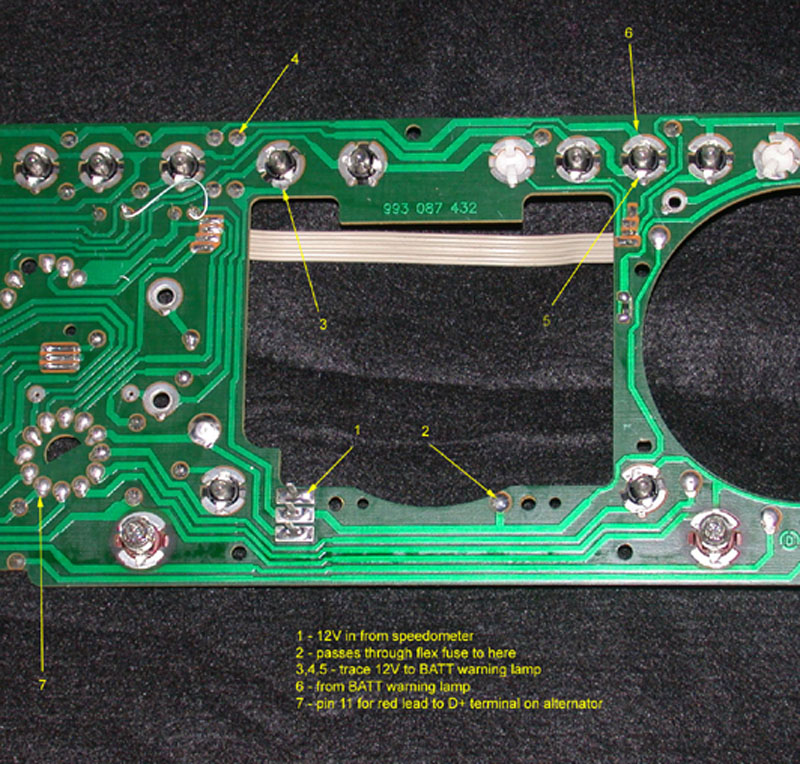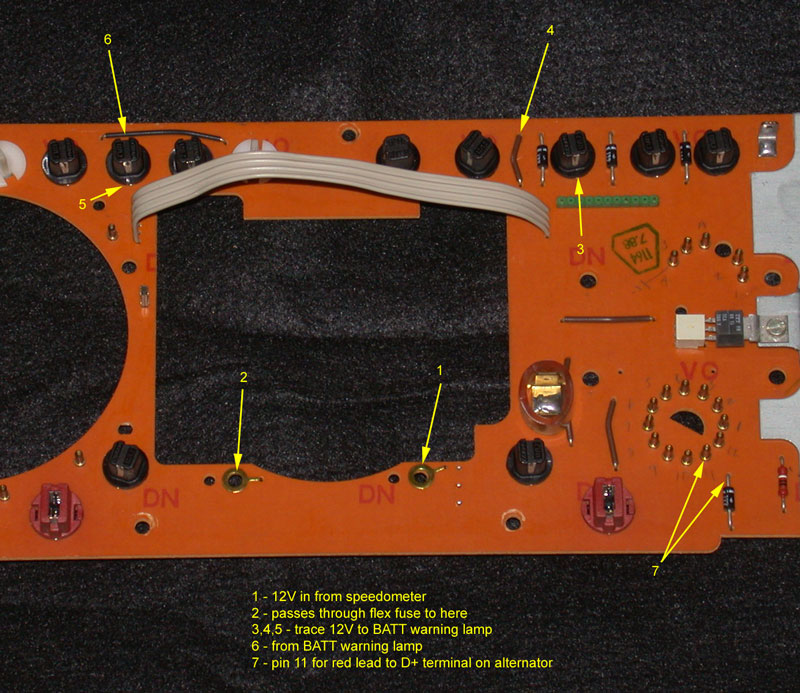|
|
|
Hi all, it's been awhile. I need a memory boost. This has happened before but I can't remember the problem. I looked in forum but can't find the old thread. My 89 244 has been sitting awhile but I now need to put it back on the road. I was getting it going and all was fine until restarting it. I turned the ignition switch on but have absolutely no dash warning lights. It starts but no lights and no volt meter working. I installed a new ignition switch a few months back but no problem after install. Is there a fuse I might have missed when doing my electrical check? Any help or just pointing in the direction would be greatly appreciated. Thanks for taking the time to read this.
|
|
|
|
|
Thanks Art, the schematic will get me to where I need to be. I also think there could be a problem with the new ignition switch I installed. I'll check the blue wire. It has been so.many years since I have worked on any of my Bricks I almost forgot how to do the work. Plus I'm so old now it's a real pain to try to bend in the right direction just to get to half this sturr. Yea, it's been several years since I was on the board. It's great to see you are still participating in these discussions. Thanks again for the help. Now I have to try to repair a dead window motor. Took it apart and can't figure out what the little white thing inside the housing is. It has two terminal lugs coming out of it that interrupt the flow from one of the brushes to the output spade terminal. Think I'll just find a used one. Wow, I miss reading all the discussions of the problems there are with these old bricks.
|
|

|
|
I hope I catch you before you try to twist yourself into position to pull the socket off of that new ignition switch, thinking you could better look at the cluster end of that wire while sitting upright in the chair with the cluster resting on top of the steering column.
Recalling the ignition switch changed for the 1990 model, I wondered if you might have used the later switch. For 1989 the part was 1212421 and in 90, with the airbags, the part changed to 1324628. Then I studied the wiring maps to see what the change might have been -- comparing the truth tables for the switch positions. Just as that began to challenge my eyes and attention span, I noticed the wire in question, to the cluster for warning light power, was red/black for 1989. Blue was its color beginning in 1990 models. Sorry Max - gave you a bum steer.
Now, to have a look at a salvaged window motor to see if I can relate to your more immediate puzzle.
--
Art Benstein near Baltimore
Eat, drink, and be thoughtful.
|
|
|
|
|
Thanks again. I haven't gotten to the point of crawling under the dash to locate the blue (now red/black) wire yet. It takes me a few days to recover from one day of working on the brick. I'll get to it this week. Now as for the window motor, the part i am referring to is inside the brush holder. It is about 1/8 " thick, 3/4 " wide and 1 " long and is whiteish in color. It is held in place by a slim piece of plastic and the back side has two wires coming out of it. One is connected to top of the tiny copper coil and the other goes to the wiring connector that goes to the window switch. I think it may be a ceramic resistor or maybe some sortof capacitor. Either way I'm getting no resistance between the two wires. If it is some type of diode then I didn't measure continuity both ways like I should have before I cleaned the unit up and put it all back together. It's ready to be put in the assembly and see if it works. It was a long and I was ready to just put the tools up and cook dinner and try to get the wife to go to sleep for the night. When I retired nearly 30 years ago I always thought I would spend my evenings sitting on the porch watching the sunset. Man was that a cruel joke. Art, if you find something on the motor please let me know. I'm hoping I can fix this thing without spending much on it. Wish I had kept all those totes full of parts I gave away years ago. Thanks for being patient and reading this extremely long text.
|
|

|
|
I found the motor.
Looks like that is not a solid-state PTC thermistor as I speculated. It is a mechanical (bi-metal) thermal cutout motor protector if I have the right product identified in this ad: http://www.ottercontrols.co.uk/thermostats.html#gsc.tab=0
For a second life on that window motor, I'd solder a jumper wire across its terminals and rely on the car's fuse for overheat protection.
--
Art Benstein near Baltimore
"If only Sweden awarded a Nobel Prize for recycling its cars." - General Colin L. Powell
|
|
|
|
|
I looked at the ad for the thermal fuse and I believe you nailed it. Thank you so much. I'm going to open the motor back up and solder a jumper as you suggested. The device is actually heat welded from the factory to the metal straps from the brush holders so replacing it could be problematic. So soldering a jumper seems to be the best solution. Thanks again for solving the mystery. Now on to fixing that useless dash assembly. I'll let you know how the motor works. Probably take me a day to put it back together.
|
|
|
|
|
Problem solved. If I knew how to attach the video of the window working correctly I would but at my age I do good to just type a sentence. Thanks again to Art for solving my problem. Now to tackle the absence of the dash warning lights. But that's for another day. Thanks all.
|
|
|
|
|
The previous owner warned me not to lower my 940 driver window all the way down
since there would be ominous grinding and noise. I goofed and heard a loud snap instead, when the motor failed to shut off and snapped the steel frame of the regulator.
It has that Otter brick that didn't do it's job of stopping the window motor when it reached it's limit.
I needed a new window regulator.
There must be a source for the Otter "current limiting switch" or whatever it is, to fix yours properly.
Bill
|
|

|
|
Hi Bill,
Does the 9-series have the express window down feature?
240's don't. The Otter thermal cutout in the 240 window motor isn't used to limit the window travel. Sorry to hear about your crunching experience, but that won't happen to Max should he bypass the thermal cutout.
--
Art Benstein near Baltimore
Knowledge is knowing loose rhymes with goose and lose rhymes with shoes. Wisdom is making the interpretation without feedback.
|
|
|
|
|
Hi Art,
No express window in the 940.
You press and hold to move the window up or down.
You can hold the switch and the window will go to the bottom and that
Otter switch will cut out the motor with rising DC current.
The cutout switch is inside the Bosch window motor assembly and not shown
in the 940 schematic. I didn't try further disassembly of the motor
to see how hard it is to swap that Otter switch out.
It might be easier to mount a new cutoff switch in the harness close to the
motor and save a headache.
In my case no fuse blew when the cutout failed, and the motor had the torque
to snap the steel motor bracket off the regulator.
What will happen with a cutout jumper in the 240 window motor if you hold the window switch too long?
The takeaway from my adventure is that if you hear a loud thumping or weird noises when the window is going down near the bottom, it's time for a new cutout switch instead of waiting for it to destroy the regulator.
If a new cutout will work in the harness it would make for a cheap and easier fix, providing that Otter doesn't price those switches more than aftermarket regulators.
Best, Bill
|
|

|
|
Now you have renewed my interest.
I'm embarrassed to admit I've misplaced (certainly not discarded) that window motor after searching for an hour Sunday. Nothing screws with my head more than something I've hidden from myself.
My guess, having never opened a window motor, is the device you're asking about is a positive temperature coefficient (PTC) thermistor used as a resetable fuse with small DC motors to protect against overheating with locked rotor current. I know the central locking actuator motors use them, but in those they are shaped like a dime (and can be replaced by one) silvered faced ceramic disks. The resistance rises when they heat up.
If the device you have is in series with the motor windings, you might be able to bypass it and have a zero-dollar fix. Or it may just need its connection cleaned. Meanwhile I'll give that search another go because I want to see for myself, and I tire of reading reply posts in this forum made up of speculation.
--
Art Benstein near Baltimore
Working people frequently ask retired people what
they do to make their days interesting.
Well, for example, the other day, Mary my wife and I
went into town and visited a shop.
When we came out, there was a cop writing out a parking ticket.
We went up to him and I said, 'Come on, man,
how about giving a senior citizen a break?'
He ignored us and continued writing the ticket.
I called him an “***hole” . He glared at me and started
writing another ticket for having worn-out tires.
So Mary called him a “s*** head”. He finished the
second ticket and put it on the windshield with the first.
Then he started writing more tickets.
This went on for about 20 minutes.
The more we abused him, the more tickets he wrote.
Just then our bus arrived, and we got on it
and went home.
We try to have a little fun each day now that we're retired.
It's important at our age.
|
|
|
|
|
Smells like it may be a bad ground or bad solder joint at the instrument cluster, but start by checking all fuses (give them a partial spin), in particular fuse 16. There's a good feature descriptive article in the FAQ here on instrument panel repair for later 700/900s that may provide inspiration. When you open the connector at the back, check all ground wires with an ohmmeter to a good bare chassis ground point. Others here may have more direct experience with your problem.
--
Dave -still with 940's, prev 740/240/140/120 You'd think I'd have learned by now
|
|
|
|
|


